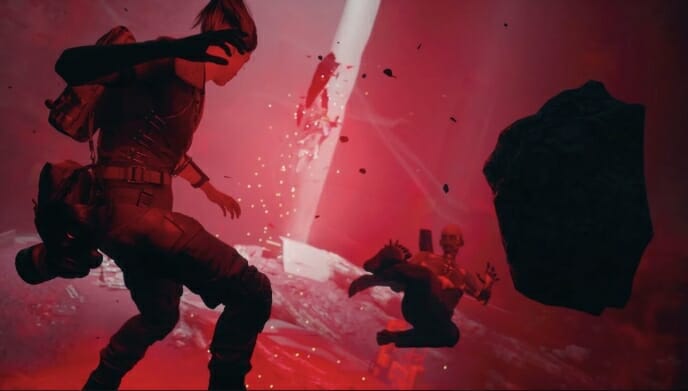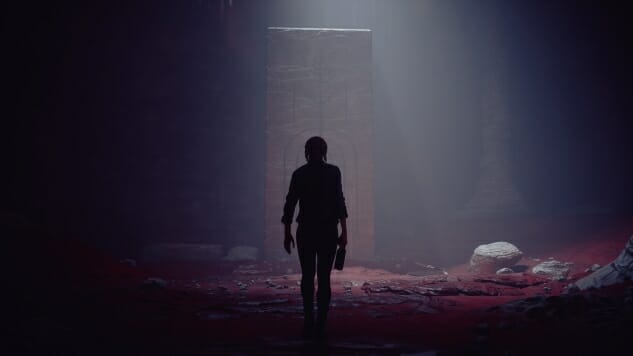When Control came out last fall, I felt like I’d been ambushed. The game had not only slipped under my radar, it was also a Remedy Entertainment game that was not an Alan Wake sequel. How could they? And yet, Control won a place in my heart by demonstrating a blend of action and sci-fi horror that was so good, it made me forgive it for not being Alan Wake 2.
Months later, the first of two planned DLC chapters for the game has arrived, taking us back to The Oldest House to pick away at some of the deeper lore behind its origins. In The Foundation, Jesse Faden, now the director of the Federal Bureau of Control, stumbles upon a cavernous sublayer beneath The Oldest House, where a strange obelisk is causing the astral plane that governs the House to bleed into reality. As she investigates the anomaly and the Bureau’s attempts to analyze its source, she encounters an unknown former Director who is at odds with The Board over how the object should be dealt with. In order to cleanse it of its corruptive influence, she must perform a four-part ritual, aided by a set of powers bestowed upon her by her mysterious predecessor. With her new abilities, she can shatter rock pillars or use a gravitational force to extract them from walls and surfaces, breaking through barriers and scaling to new heights as the situation calls. The result is an experience that reduces the bulk of files and audio logs that personify the narrative delivery of the base game, in favor of vertical platforming and fight sequences with the Hiss.
At a glance, The Foundation’s setting and story are a welcome change from the base game. Jesse’s new abilities provide an intriguing point of conflict between the board and the former Director. And her aerial maneuvering in the astral plane, key to the completion of the cleansing rituals, is tricky but thrilling. The platforming and combat sequences make maximum use of every one of Jesse’s supernatural powers.

The classic problem with an origin story, though, is that it dispels mystery to satisfy curiosity. And Control is better off when it doesn’t try to explain anything. The anomalous objects in The Oldest House, for example, are contained, not understood. The Board, with its cryptic way of speaking, is alluring because we only have a vague idea of what or who it even is. The House itself is antagonistic and sentient, but its motivations are unknown. While the expansion doesn’t directly destroy the enigma, its shift in focus does dissolve the magic. I want to know the secrets in the House, not of it.
Returning to Control also draws a lot of attention to the game’s original flaws, in that nothing seems to have been done to fix or work around them. While an expansion is hardly the time to completely overhaul a game’s defining mechanics, jumping back in cold and relearning the basics only reveals how uncompelling they were in the first place. The skill trees, for example, are formulaic, and the incremental performance boosters to Jesse’s paranormal abilities aren’t interesting enough to inspire strategy. The superpowers are fun to revisit, but Jesse’s new abilities only serve scenarios specifically designed for the expansion and otherwise may as well not exist.
Worse, the game is still marred by infrequent checkpoints paired with obnoxiously tough boss battles, to the extent that I could not finish the chapter in the allotted review time. The graveyard of side quests I left behind in the base game tells me this is experience is typical enough to justify making note of it. It’s discouraging to fail a difficult fight multiple times in a row, and to not only have to start over from the beginning, but also trek all the way back to the mission start point from the nearest fast travel spot. I spent hours on an otherwise delightful ‘80s throwback sequence that was ruined by the frustration and repetition of having to replay certain sections for no good reason. A courtesy spawn at some point in the battle would save a lot of time and achieve a better balance between the game’s suspense and pay-off.
I will continue to plug away at Control in hopes some of the narrative elements blossom into a conclusion that feels satisfying. But I miss what I loved about the game the most: the ability to scan through dozens of bureaucratic, seemingly benign report files going down the rabbit hole of Control’s disturbing world. I look forward to seeing how a few plot points play out, and I’ll stick it through to just to see them. But to relive the magic and lore-heavy intrigue of the base game, I may just have to go revisit my favorite SCP pages.
The Foundation was developed by Remedy Entertainment and published by 505 Games. Our review is based on the PC version. It’s also available for Xbox One and PlayStation 4.
Holly Green is the assistant editor of Paste Games and a reporter and semiprofessional photographer. She is also the author of Fry Scores: An Unofficial Guide To Video Game Grub. You can find her work at Gamasutra, Polygon, Unwinnable, and other videogame news publications.

